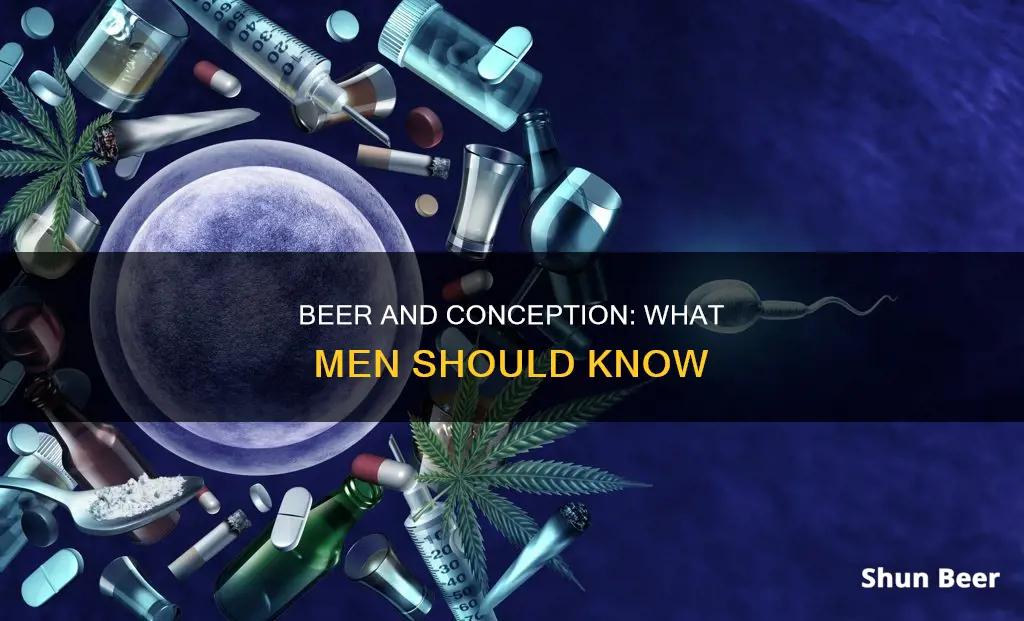
Alcohol is the most widely used recreational substance in the United States, with 86.4% of people over the age of 18 reporting that they have consumed alcohol at some point in their lives. When it comes to trying to conceive, alcohol consumption can have an impact on fertility in both men and women. While light alcohol consumption has not been linked to significant infertility cases, heavy drinking has been associated with a decrease in testosterone levels and a reduction in sperm production in men. For women, heavy drinking can cause changes in ovulation, cycle regulation, and ovarian reserve, as well as an increased risk of miscarriage and a decreased chance of live birth. Therefore, it is generally recommended that both partners avoid consuming alcohol altogether when trying to conceive, to increase the likelihood of a successful and healthy pregnancy.
| Characteristics | Values |
|---|---|
| Alcohol's impact on fertility | Alcohol can negatively impact fertility in both women and men. |
| Alcohol's impact on pregnancy | Any amount of alcohol can pose a health risk to an unborn child, even during early pregnancy when one might not know they're pregnant. |
| Recommended alcohol consumption when trying to conceive | It is recommended that both women and men avoid consuming alcohol altogether when trying to conceive. |
| Alcohol's impact on male fertility | Alcohol can decrease testosterone levels, reduce sperm production, and cause testicular atrophy in men. |
| Alcohol's impact on female fertility | Alcohol can cause changes in ovulation, cycle regulation, and ovarian reserve in women. |
What You'll Learn

Alcohol's impact on male fertility and sperm quality
Heavy drinking can also lead to liver dysfunction, which impacts the body's ability to metabolize estrogens, creating hormonal disturbances. This can further decrease testosterone levels and impact sperm production. Additionally, alcohol abuse and acute intoxication are associated with sexual dysfunction, including issues with arousal, desire, and ejaculatory function, which can create difficulties with intercourse or sperm donation for those trying to conceive.
While light alcohol consumption may not have a significant long-term impact on sperm health, consistent light drinking has been linked to a decrease in normal sperm shape. Therefore, while moderate drinking may not necessitate complete abstinence, reducing alcohol intake is advisable for those trying to conceive to optimize fertility and sperm quality.
Beer and Heartburn: Tums to the Rescue?
You may want to see also

How much alcohol is too much when trying to conceive
There is no evidence that an occasional alcoholic drink will affect sperm health. However, the more you drink, the more it can affect your overall health and fertility. Heavy drinking is particularly harmful and can lead to sexual dysfunction, lower testosterone production, reduced libido, impaired erectile function, and reduced sperm quality and count. Research has shown that men who drank five units of alcohol per week had lower sperm counts and lower sperm quality than men who did not drink alcohol.
For women, heavy drinking can cause changes in ovulation, cycle regulation, and ovarian reserve. It can also prevent proper implantation in the uterus, resulting in an increased rate of early loss of the pregnancy or resorption, even before a woman realises she is pregnant. Alcohol use during pregnancy or while trying to conceive can also increase the risk of miscarriage or pregnancy complications.
According to the NHS, pregnant women should abstain completely from alcoholic drinks as even moderate drinking increases the risk of long-term health effects in the child. Previous studies have shown that the more alcohol consumed during pregnancy, the greater the risk of low birth weight, premature birth, and foetal alcohol spectrum disorder (FASD).
If you are trying to conceive, it is recommended to minimise your alcohol intake. Ideally, you would stop drinking alcohol completely. However, if you do choose to drink, limit yourself to a maximum of 1-2 units, once or twice a week.
Beer and Augmentin: Safe Mix?
You may want to see also

The dangers of alcohol consumption during IVF treatment
Alcohol consumption during IVF treatment can negatively impact the chances of a successful pregnancy for both men and women.
Effects on Men
For men, heavy drinking has been shown to decrease the hormones needed for sperm production, leading to reduced sperm count and quality. Research has also linked heavy alcohol consumption to liver dysfunction, which can create hormonal disturbances as the liver struggles to metabolize estrogens properly. This can lead to erectile dysfunction, making intercourse or sperm donation difficult.
Effects on Women
For women, heavy drinking can cause changes in ovulation, cycle regulation, and ovarian reserve. It can also prevent proper implantation in the uterus, resulting in an increased rate of early pregnancy loss.
IVF Treatment Outcomes
Studies have shown that alcohol consumption, even in moderate quantities, negatively affects IVF treatment outcomes. One study found that women who drank one or more drinks a day had more than twice the risk of miscarriage, and this risk increased if the drinking occurred in the week before the IVF treatment. Another study of 2,545 couples undergoing IVF treatment found that women who drank at least four drinks per week had a 16% lower chance of a live birth.
Recommendations
Given the potential negative impact of alcohol on IVF treatment outcomes, it is recommended that both men and women avoid consuming alcohol during IVF treatment to optimize their chances of a successful pregnancy.
The Ultimate Guide to Choosing the Perfect Beer
You may want to see also

The link between alcohol and sexual dysfunction in men
Alcohol consumption has been linked to sexual dysfunction in men. Research has shown that drinking alcohol is associated with a reduction in testosterone production, which can lead to a lower libido and difficulty in achieving and maintaining an erection. Heavy drinking can also cause liver dysfunction, which can create hormonal disturbances as the liver struggles to metabolise oestrogens properly. This, in turn, can lead to erectile dysfunction, making intercourse or sperm donation difficult for men trying to conceive.
In addition to the direct impact on sexual function, alcohol consumption can also affect male fertility by reducing sperm quality and count. A study of 1,221 men in Denmark found that those who drank more than five units of alcohol per week (around three small beers) experienced a decrease in sperm quality. This effect became even more pronounced when men consumed over 25 units of alcohol per week (around 10 pints of beer). Another study of more than 1,200 Danish men aged 18-28 found that those who drank five units of alcohol per week had lower sperm counts and lower sperm quality than those who abstained from alcohol.
While light alcohol consumption may not have as severe an impact on male sexual function and fertility, it is still advisable for men trying to conceive to reduce their alcohol intake to a minimum. This is because even low to moderate alcohol consumption, defined as two drinks or less per day, has been associated with reduced fertility in both men and women. Therefore, for men who are planning to conceive, it is recommended to abstain from alcohol or limit their intake as much as possible to maximise their chances of success.
Beer and Warfarin: Is It Safe to Drink?
You may want to see also

Tips for reducing alcohol intake when trying to conceive
Drinking alcohol can affect fertility in both men and women. Research has shown that alcohol consumption can reduce sperm count and quality, as well as negatively impact hormones and ovulation. Therefore, it is recommended that both partners avoid consuming alcohol when trying to conceive. Here are some tips to help reduce alcohol intake:
- Set a drinking goal: Determine how much you will drink and stick to it. The recommended guidelines suggest no more than one standard drink per day for women and men over 65, and no more than two standard drinks per day for men under 65. However, these limits may vary depending on individual medical conditions, so consulting a doctor is advised.
- Keep a drinking diary: Monitor your alcohol intake by recording each drink you consume, including the type and amount, for three to four weeks. This will help you stay accountable and identify areas where you can cut back.
- Remove alcohol from your home: Having alcohol readily available can make it harder to resist temptation. By eliminating alcohol from your home, you create a supportive environment for reducing your intake.
- Sip slowly and alternate with non-alcoholic drinks: Drinking slowly and savouring your beverage can help you consume less. Alternating alcoholic drinks with water or other non-alcoholic options will also reduce your overall alcohol intake.
- Choose alcohol-free days: Designate specific days each week as alcohol-free days. This gives your body a break from alcohol and helps you develop a healthier relationship with it. You may even consider abstaining for a week or a month to reset your habits and cravings.
- Be mindful of peer pressure: Drinking culture can be influential, but it's important to stand your ground. Practice politely declining drinks and choose social activities that don't revolve around alcohol. Surround yourself with supportive friends and family who respect your decision to cut back.
- Find alternative ways to relax: If you drink to de-stress, try finding alternative ways to relax, such as going for a walk, practising mindfulness, or engaging in hobbies that bring you joy and help you unwind.
- Seek support: Cutting down on alcohol may be challenging, so don't hesitate to ask for help. Share your goals with friends and family, and consider seeking advice from a doctor, counsellor, or therapist if needed.
- Be persistent: Reducing alcohol intake is often a gradual process with setbacks along the way. Don't be discouraged by temporary lapses; view them as opportunities to learn and adjust your strategy. Remember, it may take several attempts to successfully cut down or stop drinking.
High Blood Pressure and Beer: Is It Safe?
You may want to see also
Frequently asked questions
While there is no evidence that an occasional alcoholic drink will affect sperm health, drinking alcohol is linked to sexual dysfunction and reduced sperm count and quality. Heavy drinking is particularly harmful and can also lead to liver dysfunction, which can create hormonal disturbances.
Research shows that drinking more than 5 units of alcohol per week (around 3 small beers) can decrease sperm quality. This decrease becomes more pronounced when drinking over 25 units of alcohol in a typical week (around 10 pints of beer).
There are many alternatives to drinking alcohol, such as non-alcoholic beer and wine, mocktails, kombucha, flavoured soda water, and low-sugar options. Joining a movement such as FebFast, Dry July or Ocsober can also help reduce alcohol consumption.







